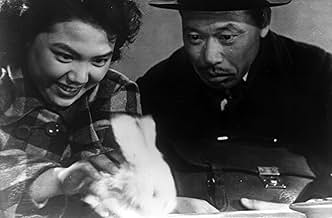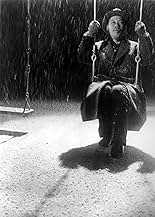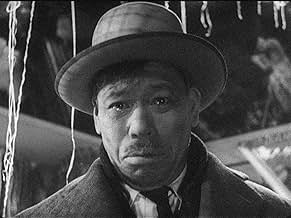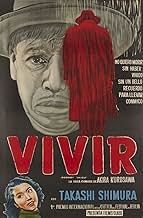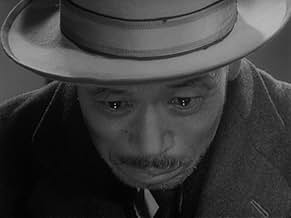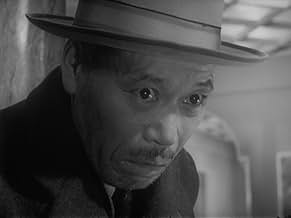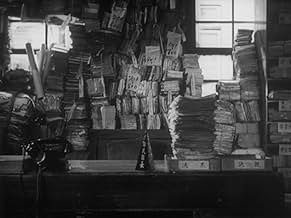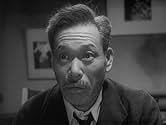Depois de descobrir que tem câncer terminal, um burocrata tenta encontrar um sentido para sua vida.Depois de descobrir que tem câncer terminal, um burocrata tenta encontrar um sentido para sua vida.Depois de descobrir que tem câncer terminal, um burocrata tenta encontrar um sentido para sua vida.
- Direção
- Roteiristas
- Artistas
- Indicado para 1 prêmio BAFTA
- 6 vitórias e 2 indicações no total
- Direção
- Roteiristas
- Elenco e equipe completos
- Produção, bilheteria e muito mais no IMDbPro
Avaliações em destaque
Kanji Watanabi is a quiet, melancholy man who has spent all his life behind his office desk doing sweet eff-all. When he is diagnosed with stomach cancer he realizes that he has been petty much dead his whole life, and searches desperately for away to live again.
This is Akira Kurosawa's masterpiece, yes, even better than Rashomon and The Seven Samauri. It is a perfect true story of everybody's life- how we don't even realize we have it until we know it will be over in a short while. Watanabi's quest for self-discovery is one of the greatest from any motion picture ever made. The all-too-true paradox is one to end all paradoxes- that Watanabi is dead, and had been all his life, until he realized he was sick, which is when he began living for the first time. Takashi Shimura, the actor best known for his role as the wise, bald-headed Samauri in The Seven Samauri, and the professor out of the early Godzilla films, plays Watanabi perfectly- in my mind, it's one of the greatest film performances of all time.
Not everyone will love this movie. It was made a long time ago, the main character is an old fogey, it has subtitles, and it's pretty long. Many people today, especially young kids, would find it boring. Well, let 'em. There's no need to worry about them, they'll always have Pirates of the Carribbean, they'll always have The Matrix. Leave Ikiru and films like it to the true lovers of cinema.
This is Akira Kurosawa's masterpiece, yes, even better than Rashomon and The Seven Samauri. It is a perfect true story of everybody's life- how we don't even realize we have it until we know it will be over in a short while. Watanabi's quest for self-discovery is one of the greatest from any motion picture ever made. The all-too-true paradox is one to end all paradoxes- that Watanabi is dead, and had been all his life, until he realized he was sick, which is when he began living for the first time. Takashi Shimura, the actor best known for his role as the wise, bald-headed Samauri in The Seven Samauri, and the professor out of the early Godzilla films, plays Watanabi perfectly- in my mind, it's one of the greatest film performances of all time.
Not everyone will love this movie. It was made a long time ago, the main character is an old fogey, it has subtitles, and it's pretty long. Many people today, especially young kids, would find it boring. Well, let 'em. There's no need to worry about them, they'll always have Pirates of the Carribbean, they'll always have The Matrix. Leave Ikiru and films like it to the true lovers of cinema.
This film touched me in a way no other film has. Filmed in black and white and gorgeous, both in the visuals and in how the story unfolds. Behold the clever manner of gradually unfolding the story as people jog each other's memories at his funeral (an obligation for them, that gradually turns into a real eulogy). Everything is told in flashbacks: the mourners' memories unfold naturally, as people remember what the man did and struggle to comprehend why.
This film I would nominate for the golden five of the century!
I first saw it in 1956 or so at a small theater in downtown Chicago. A second viewing, years later, confirmed my initial pleasure!
This film I would nominate for the golden five of the century!
I first saw it in 1956 or so at a small theater in downtown Chicago. A second viewing, years later, confirmed my initial pleasure!
I too have seen all the Samurai films. It was gratifying to watch this tender little film. How would we act if we knew when the end was coming? There are so many terrifying and tender moments in this film. The scenes with the young office mate went from charming to cold-- we knew there was no more than companionship, but she can't really even give him that anymore. The scene when he is about to tell his son about his condition and the young man goes off on a rant about how embarrassingly his father has been acting actually brought me to tears. Of course, it's the price he pays for his cold distance all those years. Then there's the whole bureaucratic nightmare of the office. Even at the wake they don't want to give credit. All the buck passers want a share of his legacy. Maybe families who are living on the edge should watch this movie. Even after more than 50 years, it wears extremely well.
Probably one of the most difficult aspects a film like "Ikiru" has to overcome is the very rough march of time. To actually find someone these days, let's say a crowd of regular movie-goers to sit down and watch a film about an old Japanese man dying of cancer would be too much to ask.
Long held shots, hardly uplifting subject, to westerners very foreign. An array of reasons not to see it. And yet, once you actually start getting into the picture it doesn't let you go. Which is why it may be rightfully considered to be a classic.
Of all of Kurosawa's films this is probably the one movie that works perfectly on a universal level. Because at its core it is about one of the most basic desires of human existence...namely to be able to look back on your life and say "It was worth it."
In its starch and unforgiving black-and-white form the movie records the time of one man's life in such a beautiful and yes, colorful way, that by the time the final moments of the film play out, it will be very hard for anybody not to be touched. A glorious moment in 20th century cinema, that will hopefully be preserved for decades to come.
Long held shots, hardly uplifting subject, to westerners very foreign. An array of reasons not to see it. And yet, once you actually start getting into the picture it doesn't let you go. Which is why it may be rightfully considered to be a classic.
Of all of Kurosawa's films this is probably the one movie that works perfectly on a universal level. Because at its core it is about one of the most basic desires of human existence...namely to be able to look back on your life and say "It was worth it."
In its starch and unforgiving black-and-white form the movie records the time of one man's life in such a beautiful and yes, colorful way, that by the time the final moments of the film play out, it will be very hard for anybody not to be touched. A glorious moment in 20th century cinema, that will hopefully be preserved for decades to come.
Kanji Watanabe discovers that he has cancer, and tries to seek some sort of meaning in his final days, he becomes aware that he's operated as a cog in the giant domestic machinery, and fights against the system.
I've been working my way through The Kurosawa films, and thus far I've been impressed with the lot, I'll be honest, I expected a Samurai film, and when it became apparent that that wasn't the case either, I thought it may have been a mystery, it wasn't that either, instead it turned out to be a rather intimate, absorbing character study.
It shows that despite being essentially part of a machine, Kanji has a very human side, only he realises it too late.
This film moved me to tears on occasion, it had me laughing, it certainly had be captivated for the whole running time. That moment where Kanji explains what's happening to his son, it was phenomenal.
I am learning more about Kurosawa with each film I watch, but I must admit, this one threw me totally off guard, it wasn't what I was expecting, it further enhances my realisation that Kurosawa was a genius.
Remember all work and no play! There's a really meaningful message in this film.
9/10.
I've been working my way through The Kurosawa films, and thus far I've been impressed with the lot, I'll be honest, I expected a Samurai film, and when it became apparent that that wasn't the case either, I thought it may have been a mystery, it wasn't that either, instead it turned out to be a rather intimate, absorbing character study.
It shows that despite being essentially part of a machine, Kanji has a very human side, only he realises it too late.
This film moved me to tears on occasion, it had me laughing, it certainly had be captivated for the whole running time. That moment where Kanji explains what's happening to his son, it was phenomenal.
I am learning more about Kurosawa with each film I watch, but I must admit, this one threw me totally off guard, it wasn't what I was expecting, it further enhances my realisation that Kurosawa was a genius.
Remember all work and no play! There's a really meaningful message in this film.
9/10.
Você sabia?
- CuriosidadesWhen Takashi Shimura rehearsed his singing of "Song of the Gondola," director Akira Kurosawa instructed him to "sing the song as if you are a stranger in a world where nobody believes you exist."
- Erros de gravaçãoWhen Kanji and the Novelist go to a busy, loud nightclub, the film has been reversed as evidenced by the backwards "Nippon Beer" banner in the background.
- ConexõesFeatured in The Siskel & Ebert 500th Anniversary Special (1989)
- Trilhas sonorasJ'ai Deux Amours
(uncredited)
Music by Vincent Scotto
Lyrics by Georges Koger and Henri Varna
Performed by Josephine Baker
[Played when entering the bar with the long-faced man]
Principais escolhas
Faça login para avaliar e ver a lista de recomendações personalizadas
Detalhes
Bilheteria
- Faturamento bruto nos EUA e Canadá
- US$ 60.239
- Fim de semana de estreia nos EUA e Canadá
- US$ 2.149
- 29 de dez. de 2002
- Faturamento bruto mundial
- US$ 114.026
- Tempo de duração
- 2 h 23 min(143 min)
- Cor
- Mixagem de som
- Proporção
- 1.37 : 1
Contribua para esta página
Sugerir uma alteração ou adicionar conteúdo ausente

![Assistir a Trailer [OV]](https://m.media-amazon.com/images/M/MV5BMTg4OWJkNjMtM2Y0Mi00MzQ5LTk3Y2YtZWMwNGUyOTIyNGVjXkEyXkFqcGdeQXRyYW5zY29kZS13b3JrZmxvdw@@._V1_QL75_UX500_CR0)
